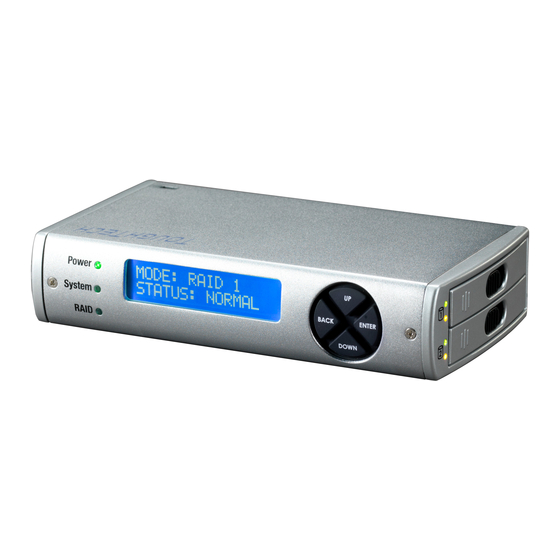CRU Dataport ToughTech Duo-3SR Manuale d'uso - Pagina 8
Sfoglia online o scarica il pdf Manuale d'uso per Immagazzinamento CRU Dataport ToughTech Duo-3SR. CRU Dataport ToughTech Duo-3SR 8.

10. Technical Specifications
Product name/code
ToughTech Duo-QR and
ToughTech Duo-3SR
Interface Types &
eSATA - up to 3.0 Gbps
Speeds
Dual FireWire 800 (400 compatible) - up to 800
Mbps (QR Model only)
USB 2.0 - Up to 480 Mbps
USB 3.0: up to 5.0 Gbps (-3SR models only)
RAID Levels
RAID 0 (striped) or RAID 1 (mirrored)
Supported
Drive Compatibility
All 2.5" SATA hard drives that are no more
than 9.5mm high
Power Switch
2 position: on/off
Operating System
Windows 7, Vista, or XP
Requirements
Mac OS X
Linux distributions using kernel version 2.4 or
above
Compliance
FCC, CE, RoHS
Product Weight
1.65 pounds with drives, 1.05 pounds without
drives (excluding accessories)
Product Dimensions 159mm L x 89mm W x 35 mm D
Warranty
2-year limited warranty. See warranty
statement for details and limitations. We don't
want anything to go wrong with your CRU
product. But if it does, tech support is standing
by and ready to help. Contact us at www.
cru-dataport.com/technical-support/customer-
technical-support.php
ToughTech is a trademark of CRU Acquisitions Group, LLC. Other marks are the property of
their respective owners. © 2011 CRU Acquisitions Group, LLC. All rights reserved.
Product Warranty
CRU warrants this product to be free of significant defects in material and workmanship
for a period of two years from the original date of purchase. CRU's warranty is nontrans-
ferable and is limited to the original purchaser.
Limitation of Liability
The warranties set forth in this agreement replace all other warranties. CRU expressly
disclaims all other warranties, including but not limited to, the implied warranties of mer-
chantability and fitness for a particular purpose and non-infringement of third-party rights
with respect to the documentation and hardware. No CRU dealer, agent, or employee is
authorized to make any modification, extension, or addition to this warranty. In no event
will CRU or its suppliers be liable for any costs of procurement of substitute products
or services, lost profits, loss of information or data, computer malfunction, or any other
special, indirect, consequential, or incidental damages arising in any way out of the sale
of, use of, or inability to use any CRU product or service, even if CRU has been advised of
the possibility of such damages. In no case shall CRU's liability exceed the actual money
paid for the products at issue. CRU reserves the right to make modifications and additions
to this product without notice or taking on additional liability.
A9-000-0003 Rev 1.1
FCC Compliance Statement: "This device complies with Part 15 of the FCC rules. Operation is
subject to the following two conditions: (1) This device may not cause harmful interference, and
(2) this device must accept any interference received, including interference that may cause
undesired operation."
This equipment has been tested and found to comply with the limits for a Class B digital device,
pursuant to Part 15 of the FCC Rules. These limits are designed to provide reasonable protec-
tion against harmful interference when the equipment is operated in a home or commercial
environment. This equipment generates, uses, and can radiate radio frequency energy and, if not
installed and used in accordance with the instruction manual, may cause harmful interference
to radio communications. Operation of this equipment in a residential area is likely to cause
harmful interference in which case the user will be required to correct the interference at this
own expense.
In the event that you experience Radio Frequency Interference, you should take the following
steps to resolve the problem:
1) Ensure that the case of your attached drive is grounded.
2) Use a data cable with RFI reducing ferrites on each end.
3) Use a power supply with an RFI reducing ferrite approximately 5 inches from the DC plug.
4) Reorient or relocate the receiving antenna.
Page: 8
